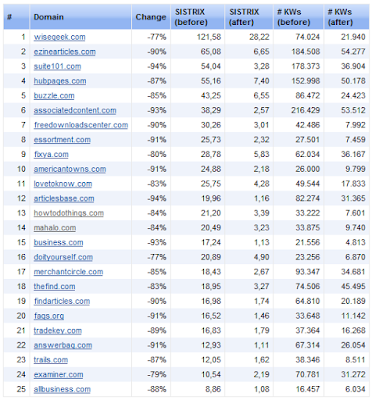Last week, Google announced that it has launched a change in its search algorithm. Their main goal is to return more relevant and more high-quality results. These past few months, Google's reliability has been questioned and doubted as more and more techniques to get into the top ranks are manipulating the results, thus resulting to low quality search results. However, they stated that the change in their algorithm impacts 11.8% of the queries. They said that this will prevent low-quality sites from getting into the top.
So how did they define low-quality sites? These are sites which copy contents from other sites and those with contents that are not useful.
A buzzphrase is brought up in this issue: content farming
Content Farming
 |
| Sorry, I can't help but post this photo. |
There is really no single definition of content farming. The term is still into open discussion. However, some refer content farming as planting keywords on sites, like writing rich keyword articles. And this boosts up the sites's ranking on Google search.
The question: Does this change really pawned the bad guys?
From the data gathered and reviewed by Sistrix, these are the top 25 websites who drastically lost keyword power:
Some sites sound familiar: eZine Articles, HubPages, ArticlesBase, and WiseGeek. The most controversial site here is Mahalo which is said to have used bots to create contents and nofollow to backlinks. Many are also questioning why eHow.com (by Demand Media who uses content farming as a model) is not included here.
To summarize all the things to keep in mind:
- Blogs infested with ads that copies contents from article directories will be thoroughly buried.
- High quality sites (which means original and useful content) will be prioritized.
- Google is anti-redundancy so stop posting things on your blog that can be found elsewhere.
- These include basic How-Tos like how to tie your shoes.
- This is a campaign to start sharing ideas and analysis, instead of copy pasting articles and news.
- This gives a chance to those who really work hard to provide quality contents on the web.
Also, the Personal Blocklist Chrome Extension gives the users a chance to block (and report) irrelevant sites that popped into the search results. This was just launched last week so it has no contribution to the said change. However, they stated that 84% of the reported sites have been taken care of by the new algorithm. With two of these combined, I believe that Google is doing its job very well.
As an internet user, your opinion, suggestion, knowledge about the said issue is greatly appreciated.
Article by Loading-Info










0 Switch to the Web version to comment:
Post a Comment